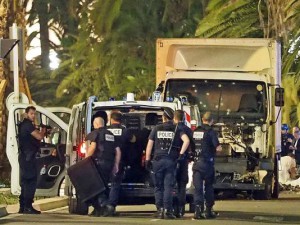The attack in Nice that killed more than 80 people is an example of a shift in tactics by terror groups who are encouraging followers in the West to stay home and wreak havoc with whatever means they have at their disposal.
The use of a truck to mow down victims in the French Riviera resort town late Thursday is part of a move to a do-it-yourself style terrorism used by lone wolfs or small terror cells to conduct attacks that require minimal planning and support, analysts say.
No group has claimed responsibility for the attack, but al-Qaeda and the Islamic State have advocated the use of vehicles to kill people over the years. These types of attacks are generally inspired, but not directed by, a terror group.
French authorities identified Mohamed Bouhlel, 31, as the main suspect in the attack. Bouhlel, who was killed in a shootout with police as he tried to flee the scene, was a French national of Tunisian descent and a resident of the seaside resort where the attack took place.
Analysts say the West needs to brace for an increase in such attacks on easy, or “soft,” targets carried out by easily available means.
“The high-impact/low-capability nature of the attack raises the risk of the repeated use of the tactic in France and allied countries in the coming months,” according to an analysis by IHS Jane’s Terrorism and Insurgency Centre, which tracks terror groups.
Vehicles have been used frequently in terror attacks in recent years. Palestinian militants have been using vehicles to attack Israelis and there have been several similar attacks in France, IHS said.
In France, two vehicle attacks were conducted in December 2014 in Dijon and Nantes that killed one and wounded 20. Another such attack wounded a soldier this January in Valence, IHS said in the analysis.
These kinds of simple attacks are increasing as the Islamic State loses territory in Iraq and Syria, where a U.S.-led air campaign is backing ground forces and pushing the militants out of their self-proclaimed caliphate.
The Islamic State has lost about 45% of the territory they held in Iraq at the group’s peak last year, according to the Pentagon. The militants have lost about 20% of the territory they once controlled in Syria.
The Islamic State has been encouraging followers in the West to remain home instead of trying to get to Iraq or Syria. That shift is a way of staying relevant, analysts say.
“They are losing territory, but they can still do these attacks,” said Mubin Shaik, a former counter-terror operative for Canadian security and intelligence services. “They are going to do what they can do.”
He said groups like the Islamic State and al-Qaeda encourage followers to conduct attacks and tell them they will claim credit for successful assaults, Shaik said.
Attacks on easy targets, such as families gathered to watch fireworks, can wreak havoc and garner headlines with limited planning and oversight. They are also hard to prevent.
“There’s some planning and logistics that go with it, but it’s not the most sophisticated attack you’ll ever see,” said Patrick Johnston, a terrorism analyst at Rand Corp. “This is sort of the next tactical shift.”
While attacks have increased lately, the Islamic State was encouraging these types of assaults against Westerners as far back as 2014, even recommending vehicles as a way to kill foreigners.
Islamic State spokesman Abu Muhammad al-Adnani al-Shami in a 2014 statement encouraged followers to kill “disbelievers” in the West by any means possible, including rocks, knives, choking, poison or running them over with a car.
Even with less planning and logistical support, the attacks achieve the objectives of radical Islamic groups, Shaik said.
“They demoralize people and create more anti-Muslim sentiment,” he said. “It’s deliberately done like this to cleave societies apart.”
usatoday.com



